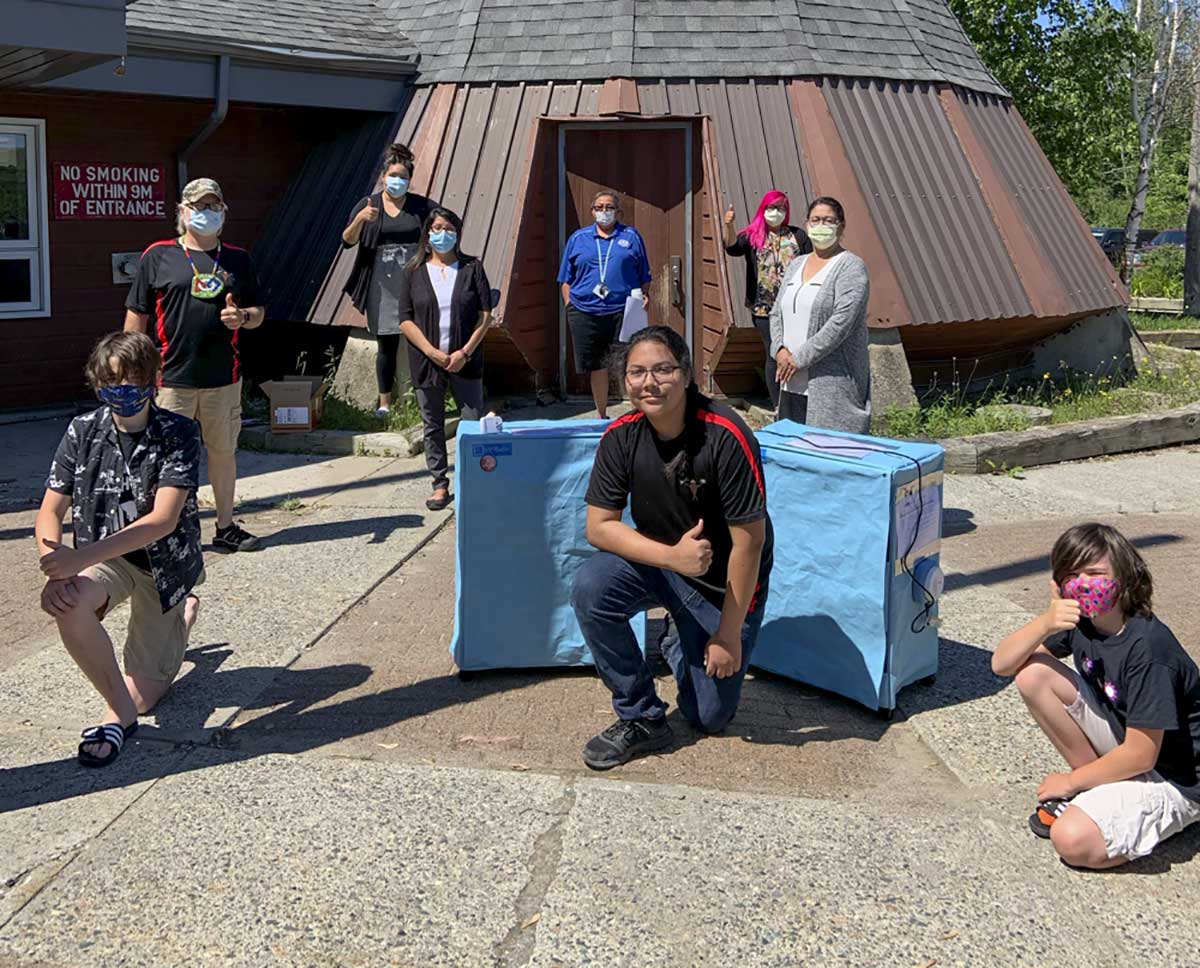MANITOULIN – Island high school robotics teams have joined efforts to reduce the spread of COVID-19 by assembling a quartet of ultraviolet (UV) sterilization carts for use in health settings on Manitoulin Island.
“It’s just an extra precaution to have, even for things like phones where you don’t know where they’ve been and can put them in the cart to clean them when you come in (to a clinic),” said Jocelyn Kuntsi, spokesperson for the Manitoulin Metal #6865 FIRST Robotics Canada (FRC) team at Manitoulin Secondary School.
“On the Island we haven’t faced many cases yet and this will help us avoid even more,” Jocelyn added.
Manitoulin Metal is joined by its elder sibling, First Nations STEM #5672 from Wikwemikong High School. Team mentor Chris Mara said the builds speak to the FRC guiding principle of ‘co-operation.’
“It’s building bridges and bonds between communities, giving the sense that we’re all working together,” said Mr. Mara. “All the teams are working together to bring out the best in each other and to up everybody’s sense of their own capacity.”
The teams built the four UV sterilization carts using four of a total of 50 kits arranged by North Bay FRC team #1305, a long-standing and well-respected FRC affiliate. That team of high school students developed two prototypes of homemade carts that are now used at the North Bay hospital.
Team #1305 partnered with mining giant Vale as part of the latter’s COVID-19 challenge—Vale tasked innovators with developing solutions for the pandemic and encouraged grassroots groups to devise low- or no-cost solutions that could be assembled in a matter of days.
Two Canada-oriented projects were greenlit for funding, a wearable medical sensor producer and FRC team #1305’s sterilization carts.

“By being able to sterilize and reuse masks we will be able to continue protecting our community, and with the help from Vale, others will now be able to help their community,” said FRC team #1305 student Fionna Truong.
The funds covered the cost of 50 cart parts kits. The team issued a call to any other FRC teams that might wish to use one of their kits to help out their communities.
As fellow Northern Ontario FRC teams, both Manitoulin Metal and First Nations STEM were quick to hear of the opportunity and request two kits each. The MSS team met up on Monday, June 22 for the build and later that day had both carts ready to deliver.
The team gave the first cart (named Gary) to the Manitoulin Central Family Health Team in Mindemoya where it was received by an excited Lori Oswald, executive director of the clinic.
“I couldn’t be more proud that they’ve been able to participate in a very positive way to support what’s happening in this pandemic,” said Ms. Oswald. “The innovation and the fact that they’ve done it here on the Island is amazing. I’m so happy we could be the recipient of it and support innovation at that level.”
Ms. Oswald said clinic workers would benefit because they could place their personal effects inside for a sterilization cycle on their way in and out of the clinic to help minimize the spread of COVID-19.
After that drop-off, the students headed to the Gore Bay Medical Centre to drop off their second unit. First Nations STEM delivered their units to Naandwechige-Gamig Wikwemikong Health Centre and Wikwemikong Nursing Home for their front-line staff.
Although Manitoulin’s robotics teams built their units from kits, these carts can be easily replicated with hardware store items. A metal wire rack cart is covered by a surrounding sheath of fabric with a reflective interior surface. A UV-C sterilization light is installed near the top and this light radiates to the whole interior.
The units take about 20 to 30 minutes to sterilize their loads. Jocelyn described the construction process, using the materials that were already the right size and all together in a handy package, as “not difficult, but meaningful.”
Manitoulin Metal continues to meet virtually every week during the pandemic. The team attended one competition this year—fewer than the usual two but still more than teams that missed all of their competitions due to the lockdown.
“It’s different because we can’t do any hands-on work on our project but it’s great to stay connected,” Jocelyn said. “It’s almost a blessing in disguise though because now we’re really thinking about the process rather than just doing it.”
The team continues to plan a possible youth camp for later in the year and Jocelyn said she was starting work on the presentation for next year’s chairman’s award competition. That award is the most prestigious for an FRC team to win and First Nations STEM took it home on the provincial level last year.